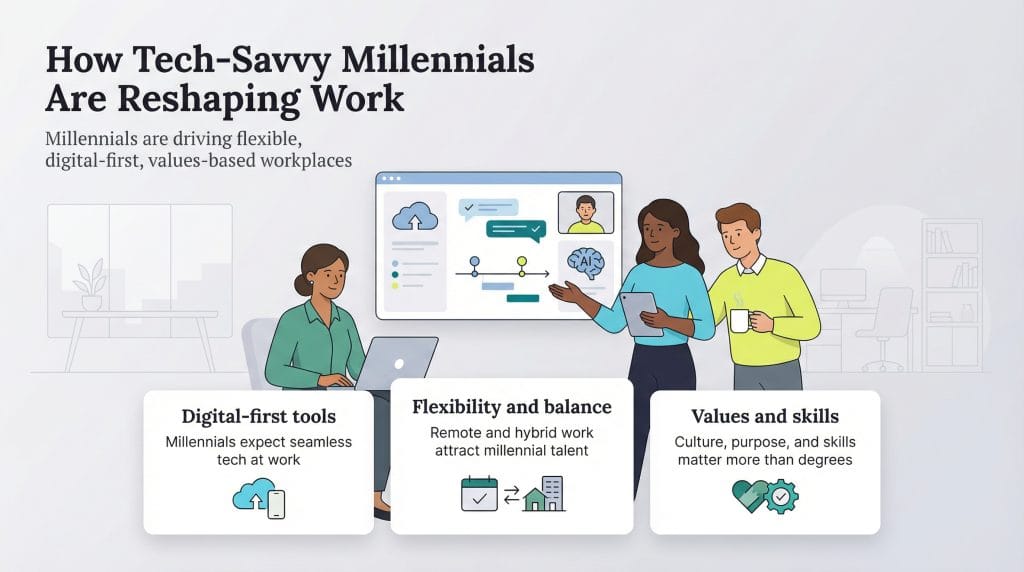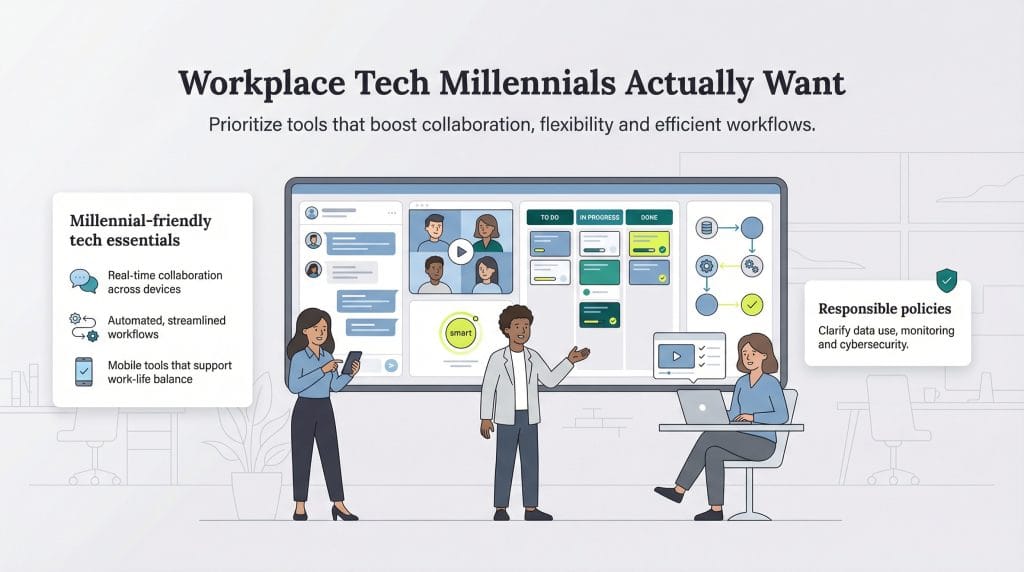Business.com aims to help business owners make informed decisions to support and grow their companies. We research and recommend products and services suitable for various business types, investing thousands of hours each year in this process.
As a business, we need to generate revenue to sustain our content. We have financial relationships with some companies we cover, earning commissions when readers purchase from our partners or share information about their needs. These relationships do not dictate our advice and recommendations. Our editorial team independently evaluates and recommends products and services based on their research and expertise. Learn more about our process and partners here.
From Texting to Tweeting: Tech-Savvy Millennials Are Changing the Way We Work
Adaptability is one of the biggest benefits of a hyperconnected, technologically proficient employee.

Table of Contents
Technology is constantly evolving, and millennials — who grew up in the digital age — are uniquely equipped to adapt. Their ease with emerging tech makes them valuable employees. This is especially the case in comparison to older generations, who may be more hesitant to embrace change.
Tech-savvy millennials are experts at using technology for communication and collaboration — sometimes to a fault. However, their ability to adapt to new platforms and introduce fresh ways of collaborating has helped reshape how businesses operate.
We’ll explore how millennial workers are transforming the modern workplace and highlight key tech tools that can help businesses attract and engage this digital-first generation.
What does it mean to be tech-savvy?

In workplaces of the past, being tech-savvy might have meant knowing your way around Microsoft Office. Today, it goes far beyond simply mastering basic software and apps.
Tech-savvy professionals have an innate curiosity about emerging technology and embrace it. They don’t just use digital tools — they seek to understand how they work and how to maximize their functionality. They know what technology should be capable of and figure out how to make it work for their needs.
Rather than adapting to technology, tech-savvy individuals make technology adapt to them. They integrate digital tools to streamline previously manual tasks. For example, they’re quick to adopt online task organizers, news feed readers, calendar and email management tools, and platforms like Slack for workplace productivity.
How are tech-savvy millennials changing the workplace?

According to the U.S. Department of Labor, millennials comprise approximately 36 percent of the U.S. workforce — the largest demographic cohort. With their steady presence, businesses must adapt to their skills, needs and preferences to stay competitive.
Here’s a look at the specific ways tech-savvy millennials are changing today’s workplaces and how organizations must adapt.
1. Millennials have changed tech-driven workplace expectations.
Millennials are the first generation to grow up with the internet, smartphones, sophisticated video games, texting and social media. The oldest members of this generation were about 26, and the youngest were 11, when the first iPhone launched; they were between 4 and 19 when social media exploded onto the scene. Because they’ve always had technology at their fingertips, millennials also expect seamless digital experiences in their workplaces.
Millennials’ natural fluency with technology has changed workplace expectations. They don’t just tolerate new tools — they expect and embrace them. Millennials push businesses to adopt smarter, faster and more connected technology that helps improve efficiency, communication and collaboration. From AI-powered automation to cloud-based project management, this generation’s ability to quickly master new tech has accelerated digital transformation across industries.
As emerging technology continues to shape the modern workplace — from smart wearable devices to AI, big data, virtual reality (VR) and augmented reality (AR) — millennials continue to drive adoption and innovation.
2. Millennials demand flexibility in the workplace.
Millennials and their priorities have played a huge role in the rise of flexible working hours and arrangements. While previous generations valued job stability and predictability, millennials know how crucial a positive work-life balance can be. They want jobs that give them a say in where, when and how they work.
This mindset has prodded today’s businesses to rethink traditional workplace cultures — accelerating the rise of remote work, hybrid schedules and freelancing as viable career paths. This preference for flexibility has also helped shape workplace policies, which has led to more businesses adopting cultures that value results — not strict work structures.
As more millennials move into management roles, expect even greater adoption of flexible work policies. Companies should embrace this shift by offering remote options, flexible hours and work schedule autonomy. This practice will attract and retain top talent in a workforce that prioritizes balance over employee burnout.
3. Millennials have popularized reverse mentoring.
Millennials are changing workplace dynamics through reverse mentoring. In this practice, younger employees teach older colleagues about new technologies and digital tools. As natural early adopters, millennials help bridge the tech skills gap — empowering baby boomers and Gen X to stay relevant in an increasingly digital world.
Reverse mentoring benefits everyone. Older workers learn essential tech skills, while millennials improve their connections with co-workers. The entire office will benefit from improved employee engagement.
4. Millennials prioritize emotional intelligence.
Another way millennials are reshaping the workplace is by focusing on emotional intelligence alongside technical skills. These professionals value companies for reasons beyond their revenue and stock performance; they assess employers based on culture, inclusivity and how employees are treated.
This generation’s emphasis on diversity, transparency, and empathy influences how businesses hire and keep employees. Millennials are particularly loyal to companies that demonstrate honesty, inclusivity and an ethical business culture. By fostering emotionally intelligent leadership, companies can build stronger, more authentic relationships with millennial employees and enhance overall workplace satisfaction.
5. Millennials value skills along with degrees.
Millennials are changing how companies evaluate talent by shifting the focus from formal education to skills and experience. This generation is among the most college-educated. But, millennials are also burdened with student debt — making them more practical about the value of traditional education.
Modern millennial leaders are more likely to prioritize skills, experience and practical knowledge over academic credentials when hiring and promoting employees. This approach has led businesses to rethink some hiring practices. Many companies now embrace skill-based assessments, which creates more inclusive opportunities for candidates with nontraditional backgrounds.
6. Millennials are helping workplaces become more adaptable.
Growing up with rapidly evolving technology has made millennials highly adaptable — and they expect the workplace to keep up. They anticipate constant change and actively work to drive positive, proactive transformation.
Millennials are often the driving force behind tech advances, both as creators and consumers demanding better solutions. Their influence has led to more flexible tools, improved communication platforms and faster, more efficient technology. Because they quickly master new tech, they push companies to stay current and innovative.
Bradford Glaser, president and CEO of HRDQ, emphasized the importance of supporting millennials’ desire to upskill and innovate.
“Millennials are eager to innovate, and when businesses provide them with cutting-edge tools and the freedom to experiment, they unlock creativity and productivity in ways that directly impact the bottom line,” Glaser explained. “The companies that embrace this shift will see the most tremendous success.”
What workplace technology attracts millennials?

Millennials are crucial team members for companies that want to stand out from the competition and maintain a competitive edge. Their adaptability makes them assets in a continually evolving tech landscape that affects businesses in all industries.
If you’re trying to create a workplace that attracts and supports millennials, evaluating your technology upgrade needs is a great start. Julia Yurchak, senior recruitment consultant for Keller Executive Search, said organizations should view tech upgrades as strategic investments — not just a way to appease millennial workers.
“Companies implementing intuitive project management platforms, mobile-friendly systems and automated workflows are seeing measurable productivity gains,” Yurchak explained. “The millennial preference for streamlined processes eliminates unnecessary steps that have plagued organizations for decades.”
Yurchak recommended starting with a user-experience-focused technology audit. “Are your systems accessible on multiple devices? Do they enable real-time collaboration? Can processes be completed without unnecessary bureaucracy?” she asked.
Here are a few technology categories your millennial team members will likely embrace:
- Collaboration tools: Communication and collaboration tools like Slack and Google Meet are a great way to support real-time global teamwork and communication.
- Presentation software: Your presentation software should be easily shareable and provide current information.
- Video conferencing: Work with reliable tools that support remote work and work-life balance.
- Interactive whiteboards: These devices are a great way to bridge the gap between generations.
- Automated systems: Most of today’s business software, including the best CRM software and email marketing campaign platforms, have built-in automation functionality that simplifies processes and boosts productivity.
- Self-service technology: Employees of all ages will appreciate self-service systems for managing schedules and HR data.
- Mobile compatibility: Incorporate mobile apps and devices that allow your team to work from anywhere.
- High-quality audio tools: Audio tools help create comfortable and efficient work environments.
Ed Hones, attorney at Hones Law Employment Lawyers PLLC, emphasized that investing in technology goes beyond buying new digital tools.
“Upgrades must be accompanied by clear usage policies to avoid legal pitfalls, such as improper electronic monitoring or failure to properly track overtime,” Hones advised. “I often advise companies to implement strong cybersecurity measures, transparent policies on data use, and training programs that address both the advantages and risks of new workplace technologies.”
In other words, supporting your millennial workers means implementing technology that boosts efficiency, collaboration and flexibility — and implementing those tools thoughtfully and responsibly.
Jennifer Dublino contributed to this article.








